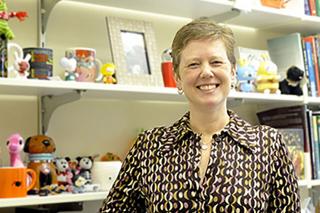"Being an ally requires time, emotional effort, and risk," says SLIS Professor Lisa Hussey. "These are not always things that people think about when they say they're an ally. Posting something to Facebook saying you're an ally is a place to start but the problem is that, a lot of times, that's a place where people finish."
Hussey has been researching the subject of Allies and Allyship in Library and Information Science, with support from School of Business Assistant Teaching Professor Erin DeCurtis and SLIS student Andy Yzaguirre '23MS. Hussey presented the research at the annual conference for the Association for Library and Information Science Education (ALISE) in late October.
The research began with a qualitative survey, asking people to provide definition of the terms. "The idea is, what are you doing that makes you an ally?" says Hussey. "You don't claim the title of ally, it is given to you. It's also not permanent. You may be an ally in one setting but not in another."
The goal is to get a sense of how these concepts are perceived in LIS. "These are terms that are tossed around all the time. People talk about being an ally and participating in allyship," says Hussey. "I've found a big gap between people who say they are allies and acting as allies and the expectations of those who are supposed to be benefitting from allyship."
Hussey and her co-authors conducted 32 interviews of LIS professionals, in person at the American Library Association conference in the summer of 2022, and via Zoom. The interviews, which ranged from 20 minutes to over an hour, included these questions:
- Provide an example of someone acting as an ally.
- Can you think of a time when someone intended to act as an ally and did not?
- What can people with power and influence do to encourage allyship?
- What role do ally and allyship play in library professions?
The results were filtered by the type of institution that employed each participant, particularly public and academic libraries, and also compared how people identified as an ally across demographic breakdowns. Participants were White and people of color, and Hussey tried to highlight intersectionalities whenever possible. "You can be a part of one group, an ally to another, and not at all helpful to a third group. For me, as a female, I deal with unrealistic expectations and marginalization due to my gender, but that doesn't mean that I know what it's like to be a BIPOC male or female or queer female. I'm marginalized as a female but I don't understand other perspectives."
Hussey is well aware of how charged discussions of racism, privilege, and allyship can be. "It's difficult to talk about, depending on the group you're in, your status and your levels of power," she notes. In the interviews, Hussey intentionally used language about power and influence, as opposed to leadership or administration. "I have power as a tenured faculty member and as a White cis woman. I wouldn't identify as a leader, but I have power and influence to introduce ideas to the next generation of librarians."
The research has inspired her own self reflection. "I've gone back and looked at things that I've done that have been performative, that I now stop and question," says Hussey, recalling seeing an old Facebook post in which she identified herself as an ally. "Anything related to EDI [Equity, Diversity, and Inclusion] work is always evolving. The best thing I can do is to say, I will be an ally, what do you need me to do? Let them define it. Not, I'm an ally, and here's what I will do for you."
Hussey has been researching diversity in LIS since 2003, starting with her dissertation looking at why people from marginalized groups enter the profession. At Simmons, her work with School of Social Work Professor Johnnie Hamilton-Mason, and serving on the committee Truth, Racial Healing, and Transformation Through Undoing Racism, provided a turning point. "If there's one thing I've learned, it's that I'm never going to learn everything. I'm going to make mistakes, but I can make sure I don't repeat them, keep an open mind, and keep learning."
She also addresses the issue of allyship fatigue, when allies use their privilege to not have to do the hard work. "Three years ago, I did the March on Boston," says Hussey. "But if I got tired, it was very easy for me to go home. It's easy for me to not attend the next BLM rally, because I'm White. A BIPOC woman may not go to the protest, but she can't leave her Black skin at home. Not everyone has the privilege to take a break."
The group is looking forward to getting a diverse perspective when the research is presented at the Joint Conference of Librarians of Color (JCLC) in February 2023. "I'm hoping for some pushback at the Joint Conference," says Hussey. "I want to hear if it's not their experience, or if there is something else I need to think about. I want to hear from the people who are supposed to be benefitting from allyship."

